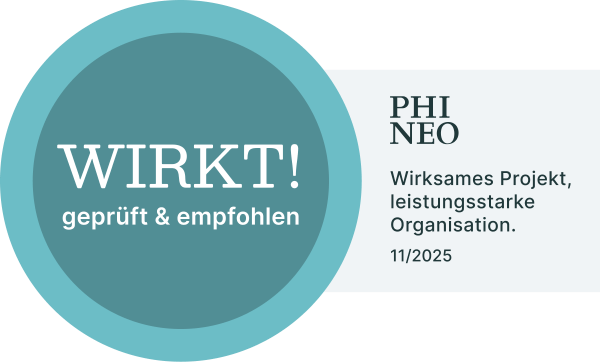CURRENT PROJECT
#vrschwrng
An interactive toolkit against conspiracy theories

The model project aims to give young people the opportunity to have a critical look at conspiracy theories and their underlying narratives.
Timeframe: 2020 - 2029
Through the internet and social media, political conspiracy theories, "alternative facts" and disinformation in particular have gained considerable visibility in recent years. Extremists and populists use conspiracy narratives to further polarise societies and create tensions between different communities and stakeholders. Conspiracy theories offer simple explanations for our globalised, complex world and the profound changes it is undergoing, dividing the world into a simple good and evil. By identifying supposed "culprits", extremist attitudes can be encouraged and people can be radicalised. They aim at undermining trust in democratic institutions, facilities and the media. Scientific studies have shown that the susceptibility for believing in conspiracy theories is independent of age, gender and level of education. Furthermore, conspiracy theories and disinformation have an effect on the development of one’s own identity.
The model project "#vrschwrng - An interactive toolkit against conspiracy theories" aims to give young people the opportunity to have a critical look at conspiracy theories and their underlying narratives (the name derives from the German word for 'conspiracy', Verschwörung). The different modules encourage socio-emotional learning and strengthen not just the young people's ability to deal with conflict but also their ambiguity tolerance.
A dialogue-oriented, participatory process in the form of a peer group approach in the development of learning media strengthens not only the knowledge and the ability of reflection of the young people directly involved in the processes. It also ensures the adequate address of the target group: learning materials aren’t just developed for the target group, but together with it.
On 26 November 2025 our project was awarded the "Wirkt-Siegel" seal by the German non-profit PHINEO. The seal is awarded to non-profits and projects that demonstrate effective social commitment.

Background
Approach
The model project "#vrschwrng - An interactive toolkit against conspiracy theories" strengthens young people in dealing with conspiracy theories by (1) imparting knowledge and skills for the identification of conspiracy theories and the narratives behind them; (2) increasing sensitivity for the dangers that conspiracy theories pose for society, democracy and one's own way of living; (3) increasing interest in democratic participation and successful problem solving and (4) enabling them to experience self-efficacy through creative media production. The toolkit with its multimedia modules sharpens the young people's reflectivity skills, strengthens their ability to deal with conflict and their ambiguity tolerance, and stimulates socio-emotional learning. In this way, the resilience towards conspiracy theories and various extremist tendencies is strengthened.
The project aims at three different learning levels: the cognitive level (knowledge transfer), the socio-emotional level (providing skills to deal with conspiracy theories) and the action and behavioural level (attitudes and value orientations).
The project includes a multimedia field observation and research across the different extremist tendencies, which are carried out together with partner organisations. The results of the monitoring will be processed and edited for didactic use.
On this scientific and pedagogical-didactical basis, different topics and their methodical implementation will be identified.
These topics include:
- T1: Basic knowledge about conspiracy theories
- T2: Narratives and risk potential
- T3: Conspiracy theories and social media
- T4: Dealing with conspiracies
- T5: Society and democracy
The project thus directly addresses the needs of young people as a target group: the search for value orientation, opportunities for participation and ways of evaluating information. The dialogue-oriented and participatory concept of the project ensures a high level of acceptance by the young people involved, also with regard to the jointly developed learning media. Through the creative interaction in the form of producing their own media content and publishing it on the project platform, the young people experience self-efficacy.
Goals and results
The topics will be developed together with an interdisciplinary peer group. As a result, they will come up with modules that include multimedia and innovative learning materials for the toolkit. The toolkit will be offered on a public platform. In addition, young adults will be trained as teamers, and teachers and social workers as multipliers.
Until the end of the project, trained instructors will give 120 workshops in Germany. We organise multiplier workshops in 2023.
Key actors
Key actors of the project are young people aged between 16 and 20 years from different educational backgrounds and a peer group aged between 17 and 30 years who will develop the toolkit.
The project will also provide trainings for multipliers. Multipliers can be teachers from different types of schools, social workers or pedagogical staff. They will be provided qualification for the use of the toolkit.
Partners and funding
Donors
The model project "#vrschwrng – An interactive toolkit against conspiracy theories" was funded by the Federal Ministry for Family Affairs, Senior Citizens, Women and Youth, the Bundeszentrale für politische Bildung and the Jugendstiftung Baden-Württemberg from January 2020 to December 2024.
Since 2025, the project is funded through the state programme "Hessen – Active for Democracy and Against Extremism" of the federal state of Hessen.

Updates from this work:
Publications from this project:
Project lead
Nicole Rieber
Head of Unit
email hidden; JavaScript is required
Team members
Uli Jäger
Fidel Bartholdy
Sabine Ulmer
Desiree Wegenast
Media contact
You can reach the press team at:
+49 (0) 177 7052758
email hidden; JavaScript is required


